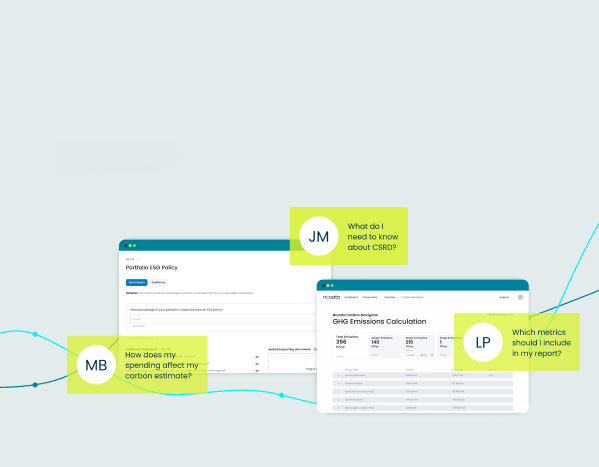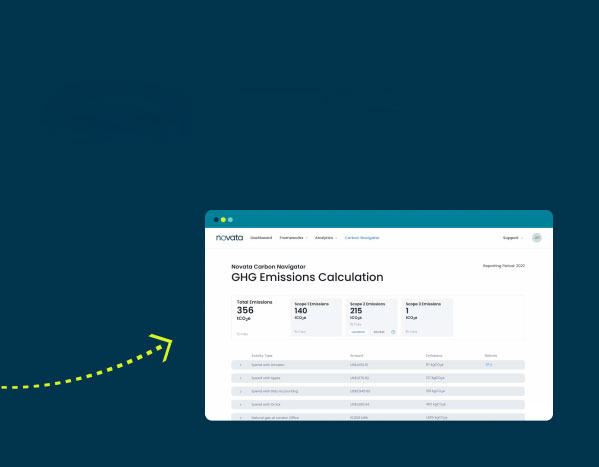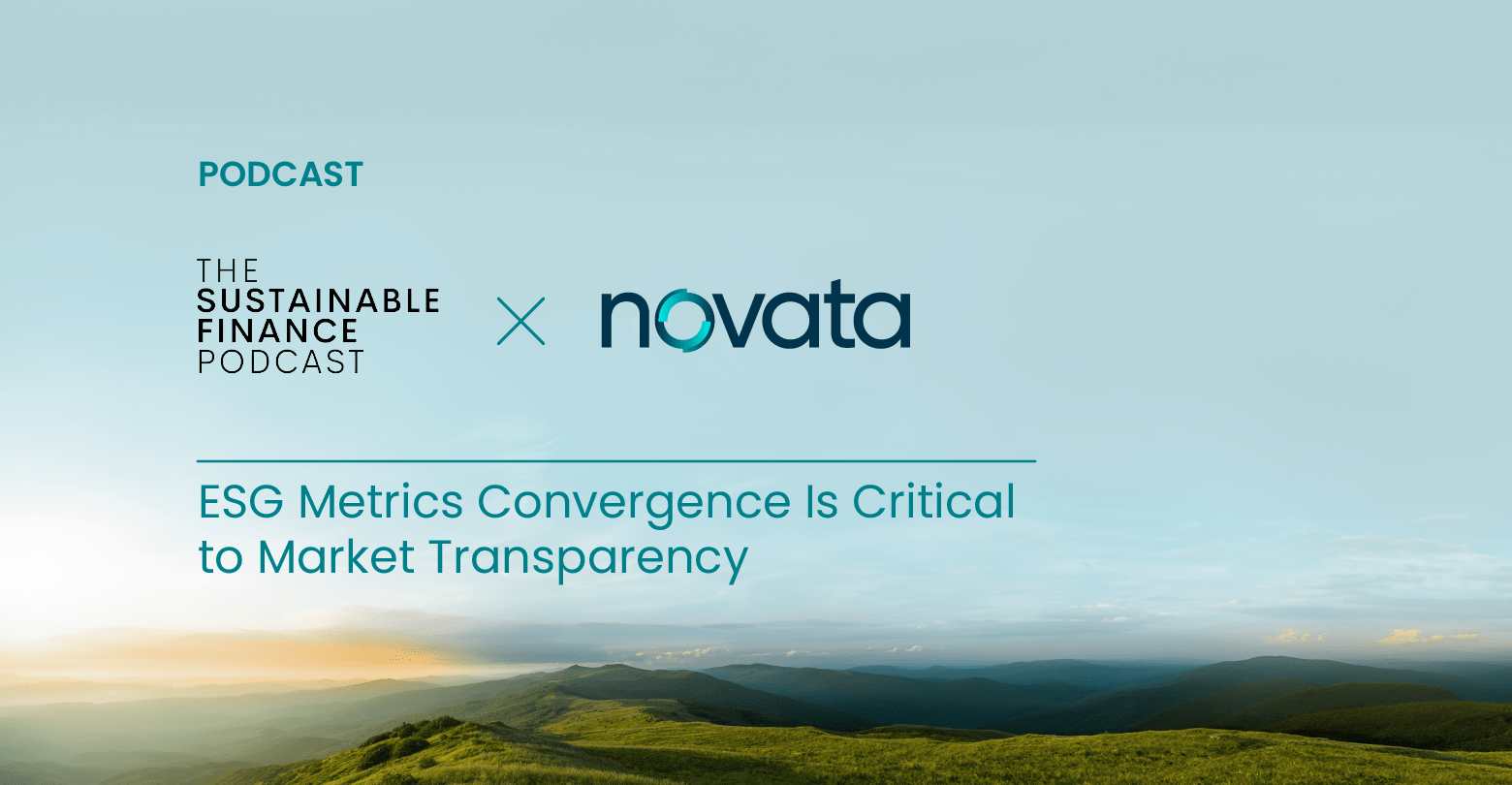Beth Meyer, Chief Legal Officer and metrics and regulation expert at Novata, sits down for an insightful conversation on building sustainability initiatives within organizations. Listen as Beth provides insights on how to know when it’s time to hire a sustainability lead and advice on navigating ESG reporting for firms without dedicated sustainability teams.
About Sustainable Intelligence
Sustainable Intelligence is an interview series from Novata that explores ESG and sustainability in the private markets. From carbon accounting to using data to create value, the series dives into the challenges and opportunities facing private market investors and company leaders as their integrate ESG across the business and respond to regulatory requirements. Each episode centers authentic dialogue, highlighting experts at the forefront of advancing ESG data collection and driving meaningful progress in the sustainability landscape. Listen to more episodes.
Conversation with Beth Meyer (Transcript)
Ella Williamson: Welcome to Sustainable Intelligence, where we discuss all things, ESG and sustainability for the private markets Brought to you by Novata. I’m Ella Williamson and I’m thrilled to be your host.
Today, we’re thrilled to have Beth Meyer, Chief Legal Officer at Novata, joining us. In addition to leading Novata’s legal team, she spearheads the company’s metrics and regulations team. Prior to joining Novata, Beth was Associate General Counsel and Head of ESG for Techstars, a global venture fund and accelerator. Together we’ll discuss where to begin if you don’t have a sustainability team and provide you with the tools and insights you need to confidently navigate the regulatory landscape. So let’s dive in and explore the path to sustainable success. So when do you know it’s really time to hire a sustainability lead?
Beth Meyer: It’s an excellent question because I don’t think it’s like an aha moment, although those can definitely occur if you get a pressing request from a key stakeholder. Arguably, I’d say now. I think, one, it’s very, very hard to find talent in the sustainability space. It’s become something that is booming in demand and obligations on companies and to have individuals with that background.
So, my cheeky first answer is like, get there now, get somebody. I think next is it’s dependent on the needs of the company. So either you’re gonna have a regulatory pressure that is going to lead to the decision to have someone internally that can quarterback this. Or you realize that it’s a core part of your business strategy and that’s something you’ll be able to execute on if you don’t have somebody leading it.
One thing I’ve seen often is sustainability gets considered a priority, either you have shareholders or you have investors or you have customers demanding more on sustainability. And there’s this idea that it can be a side of the desk job for a number of individuals across the company. I think that can work.
I think it’s a temporary solution. And you’re ultimately gonna face a decision of, do we need to deprioritize sustainability? Or do we need to hire a lead? So getting in front of that and saving yourself, the kicking the can, and makING the decision later of making that executive choice of now’s the time to get a sustainability lead is often more helpful.
Ella: Great answer. I think it sounds like now is the optimum time, but we understand that not every business is in that position. So moving on slightly, if you aren’t currently in the position to hire a head of sustainability or it doesn’t really make sense right now, how should you tackle ESG reporting?
Beth: Get help and get a tool. Absolutely, not every company is in the position to have the budget to hire a sustainability lead, develop a team, that’s a lot of resources. It’s also a long-term commitment, bringing somebody on full-time. There’s a lot of amazing tools out there, shameless pitch for Novata, but there’s tools that will walk you through the process. So any individual that holds a more senior position that has visibility across the company or if you’re in the investment space of visibility across your portfolio, they can really streamline this and make it a smooth journey while also educating you through the process. I think that’s the best choice.
Of course you can get a consultant, which is almost just like outsourcing the sustainability lead. That’s helpful. That’s often a pricey choice and also not something that no pun intended is sustainable. Whereas if you have a tool, that’s something that can also segue into putting, when you do hire somebody in a long-term role, in a position to succeed because you’ve been collecting the data, you already have the insights and you already have a tool that you can rely on.
Ella: Great. And it sounds like it really is a journey. And there may be quick fixes that have to happen along the way, but ultimately it’s finding that sustainable future for your business. So, if we have to think about what would be more helpful for a firm, would it be to hire that sustainability lead, a tech solution, or would it be really getting that consultant that you spoke about?
Beth: I think, you know, you can’t control what you don’t measure. So to get a handle on how much you’re already doing in sustainability is probably the first step to know are we actually doing a lot? Maybe we don’t need a sustainability lead right now. After auditing all we do and collecting data across our operations, we’re actually pretty good when it comes to sustainability. You can’t make that choice or decision unless you’ve collected the data, which often means a tech solution first. So I think getting in there, rolling out a tech solution, understanding your universe, the opportunities for you when it comes to sustainability, your current risks, whether you need an individual to manage those risks, or if you can really handle it in-house with your existing team.
I think that’s the first step. So I’d say, start with the tool. If you’re in the lucky position to hire a full-time person, go to sustainability lead, if that’s not an option and you think you still have gaps, get a consultant to fill the gaps.
Ella: Thanks for that, Beth. And I think that’s really sound advice in terms of the next steps that businesses should be taking.
That’s a wrap for today’s episode, but a big thank you to Beth for sharing your expertise. Until next time, let’s keep building sustainable intelligence together. Find out more at novata.com.






